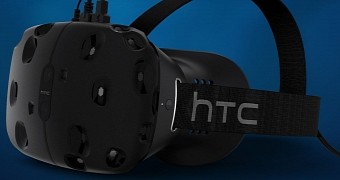The team at Epic Games is announcing that the Unreal Engine game development suite is getting a new update today, labeled 4.8, which is mainly designed to introduce full support for the Steam virtual reality platform from Valve, which will be used by the Vive device.
This means that teams interested in the technology can start creating titles linked to it as soon as they get some time with the software, using technology like Lighthouse and the special controllers.
Epic Games says that SteamVR is entirely integrated into Unreal Engine, for both the native code and the Blueprint visual scripting language.
Gabe Newell, the leader of Valve, states, "Epic is once again taking a leadership position in the technology solution space by embracing the industry-wide momentum toward VR. With SteamVR integrated into its engine tech, Epic is making it that much easier for Unreal Engine developers to be successful."
Valve's virtual reality solution is called Vive and is being created in partnership with a team at HTC; it is set to be launched before the end of the year.
Other game development suites will probably also offer support for it before the device it out, giving developers more than one option for their virtual reality titles.
Vive needs extended support to become a success
The partnership between Valve and Epic Games makes a lot of sense because the two companies tend to dominate their respective fields at the moment and are aiming to expand into new ones.
The Vive virtual reality solution needs to get as much support as possible from development teams on launch in order to be attractive to potential customers.
Epic Games has made Unreal Engine almost free for development teams, and that means almost anyone with an interest in VR can get the development suite and use it to explore its possibilities.
Valve and HTC are saying that for Vive they have solved all the problems associated with VR, including latency and motion sickness.
The two companies have not offered high-profile video games so far that can use the technology in interesting ways.
Vive will face tough competition from the Oculus Rift and Project Morpheus, which is set to be linked to the PlayStation 4. Both are expected to arrive in 2016.

 14 DAY TRIAL //
14 DAY TRIAL //